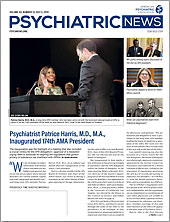Leaders from America’s Frontline Physicians: The Group of Six, of which APA is a member, flew into Washington, D.C., last month to meet with half a dozen lawmakers on Capitol Hill on behalf of its 560,000 physician and medical student members.
During his first visit to the Hill as APA president, Bruce Schwartz, M.D., spoke with lawmakers about the importance of passing the Mental Health Parity Compliance Act (see box on page 18); he also met with the staff of Sen. Bill Cassidy (R-La.) to thank them for their help in securing the bill’s introduction.
Other pressing health issues raised by the Group of Six included amending rules governing addiction treatment records, combating vaccine misinformation and rising drug prices, and funding public health research on gun safety. “Politicians on both sides of the aisle were extremely receptive to our concerns about 42 CFR Part 2, the need for parity enforcement, and funding for research on gun violence,” Schwartz said, summing up the day.
In addition to APA, the Group of Six includes the American Academy of Family Physicians, American Academy of Pediatrics, American College of Obstetricians and Gynecologists, American College of Physicians, and American Osteopathic Association.
Schwartz and the other physicians from the Group of Six discussed the need to shore up patient safety risks posed by a regulation known as 42 CFR Part 2, which requires addiction treatment providers to obtain written consent from a patient before sharing any patient information with other treating physicians. The Group of Six is seeking amendments to this regulation to give all treating physicians ready access to a patient’s entire medical record, including any substance use treatment history, to avoid life-threatening situations.
One physician told lawmakers about a recent experience of treating a patient in his office and then by happenstance running into that same patient in the substance use disorder treatment facility within the same hospital. The physician had no idea the patient he was treating was receiving medications for substance use disorder, he explained to lawmakers, adding that the segmentation of those records poses real risks.
During their conversations with lawmakers throughout the day, Schwartz and the other physician leaders also shared their experiences of how rising drug prices have impacted their patients.
The Group of Six also indicated their support for finding a solution that would promote greater transparency around billing. At issue is so-called “surprise billing,” which arises when patients receive unexpected, sky-high bills because not all their service providers or the hospital in which they were treated were in their health insurer’s network. Another related concern is “balance billing,” which arises when an insurer pays only a small portion of a service provider’s or physician’s fees for a particular service.
Momentum around medical billing issues is building on the Hill, with President Donald Trump and lawmakers from both sides of the aisle agreeing that legislation is needed in this area; several bipartisan bills around medical billing are being floated. ■
See "APA Endorses New Parity Enforcement Legislation, Urges Speedy Passage"
here.

